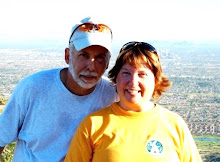I had an incredible day yesterday as I was exposed to a
rather radical and revolutionary idea that the State Government of Arizona was
more concerned about an individual and their circumstances than just following
Federal guidelines that are only about providing services. I know that
providing ongoing services for anyone creates a dependency that often means the
individual or family will never achieve self-sustainability. I was invited to
be part of a special advisory board for the Director of the Department of
Economic Security to listen to both recipients of State Services and those,
like me, that have a passion to see under resourced neighborhoods become
healthier.
The initial part of this advisory group meeting focused on
the organization that comprises DES. It was overwhelming to see thousands of
employees give out billions of dollars of services. All of these have a place
in seeing our marginalized families receive needed assistance but the glaring
difficulty was that all of these different programs acted independently of one
another and the ultimate goal wasn’t to get these families on their ‘feet’ but
to provide services. The notion of a perpetual safety net wasn’t the intended
goal of both State and Federal programs but this is what has happened over the
last few decades.
It was exciting to hear Director Carter share his vision of
thinking outside the box and then actually implementing a movement that would
both listen to the working poor and those who have a passion to empower these
individuals to have the best life possible. The discussion that followed with a
few of us speaking up showed the apparent need for the Federal and State Government
to rethink their approach to the better safety net that actually works and ultimately
sees individuals get the help they need to ultimately get off assistance from
both the State and Federal Government.
I know that it is easy at times to dream big and then take
small steps to see life get better. The challenge in the State of Arizona is
that we have too many poverty jobs, employment that won’t provide enough for a
family to sustain themselves and the business climate isn’t at a stage where
new jobs will be created that will cater to helping the working poor. If you
add the dilemma of understanding the cultural factors and bias in hiring people
of diversity the stage is set for what has to be addressed if DES is going to
transition from a perpetual safety net to an empowering agency that sees
individual rise to their potential.
It would be too easy to criticize the short sightedness of
whether the hiring of a few case coordinators is going to ‘fix’ the problem.
The clear need is to see the community itself rise to the opportunity to
partner with DES and their staff to dream together, work together and then to
make the necessary changes to see the system radically different and
individuals choosing to take ownership of their circumstances. I am privileged to be part of the movement
that I believe will impact our State and the Federal Government.


No comments:
Post a Comment